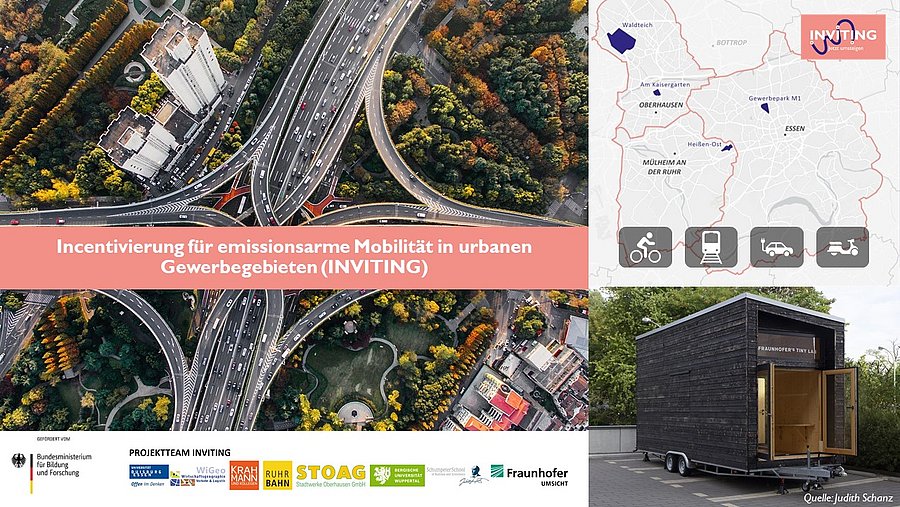Incentivising low-emission mobility in urban business parks (INVITING)
Current social and global challenges require a change in our mobility behaviour. Work-related mobility in particular harbours enormous potential for improvement. The distance travelled between work and home has increased enormously in recent years. Although pollutant emissions per kilometre have decreased, absolute greenhouse gas emissions have risen due to the increase in (commuter) traffic (Leopoldiner, 2019). With an area of 6,400 square kilometres (evaluation of basic DLM), commercial and industrial areas are strong centres for commercial traffic. For this reason, new mobility options for the sustainable organization of work and business trips and the associated modal shift are necessary. Incentivisation measures can make a decisive contribution to ensuring that such a change takes effect quickly and effectively (e.g. Mercator, 2015; Rudolph, 2014). As part of the three-year project "Incentivisation for low-emission mobility in urban business parks" (INVITING), which was launched in November 2020, existing incentive measures (e.g. company bicycles, job tickets) are being used and reviewed in various business parks in order to develop and evaluate future mobility offers and systems. Based on these results, psychological, planning-related and politically relevant options for action and implementation can be derived. An inter- and transdisciplinary research consortium has been formed to carry out this third-party funded project InvitinG, which is funded by the Federal Ministry of Education and Research (BMBF). The research consortium consists of the following members:

Commuter stress - consequences for health and performance
According to recent studies, long commuting times can lead to health problems (BAUA, 2015). Commuters in particular are exposed to traffic jams, delays and other delays that require a considerable degree of self-control, which demands limited mental resources and can cause states of exhaustion. This so-called "commuter stress" can not only have a negative impact on mental well-being, but also on professional performance, for example through counterproductive behaviour or a decrease in work motivation. Therefore, one of the core tasks of the Chair of Work, Organizational and Business Psychology as part of the third-party funded project InvitinG is to use suitable survey methods (e.g. diary or weekly diary studies) to compare currently used mobility options (e.g. use of public transport and/or car) with their effect on motivational processes, health and performance. In addition to the survey of work-related (e.g. New Work) and personal resources (e.g. work-life balance), stress levels and mental well-being are also recorded. In addition, we also integrate physiological indicators (e.g. heart rate variability and sleep quality) into our survey to enable a differentiated assessment of the stress and strain effects of commuting and other mobility options.
Term:
2020 - 2023
Funding organization:
Federal Ministry of Education and Research (BMBF)
Partner:
Fraunhofer Institute for Environmental, Safety and Energy Technology (UMSICHT)
Chair of Economic Geography Transport & Logistics at the University of Duisburg-Essen

